 While the U.S. corporate-owned media misdirect our attention by focusing on various pretend "scandals", the Obama administration has quietly sought "fast track authority" to secretly negotiate and ram through Congress the Trans-Pacific Partnership (TPP).
While the U.S. corporate-owned media misdirect our attention by focusing on various pretend "scandals", the Obama administration has quietly sought "fast track authority" to secretly negotiate and ram through Congress the Trans-Pacific Partnership (TPP).
The TPP is a NAFTA-like "free trade" agreement that not only threatens our national sovereignty, but aspires to supplant the sovereignty of all participating nation-states with a privately-controlled, all encompassing, corporate, global "investor state". The "investor-state" finds its embodiment in the creation of arbitration tribunals which are granted the power to negate the effectiveness of laws passed by individual nation-states.
As explained by Margaret Flowers and Kevin Zeese, through TPP, U.S. corporations and their K-Street lobbyists seek to by-pass the legislative process and democratic accountability in order to undermine Internet freedom, U.S. environmental laws and regulations and local laws protecting the health and safety of our citizenry. "Many of those corporations that have failed to get what they want from Congress are now getting their way through the secret back door of the TPP," they write. Sen. Elizabeth Warren (D-MA) has also issued a warning that Wall Street is attempting to gut Dodd-Frank through trade agreements such as TPP.
But, as government watchdog group Public Citizen observes, TPP --- which is now augmented by a joint U.S./E.U. call for a similar Transatlantic Free Trade Agreement --- threatens not only U.S. sovereignty but the ability of all nations to protect their own citizenry through the expansion of an already "notorious investor-state system". Such a system allows ethically compromised international business arbitration tribunals to compel nation-states to fork over "taxpayer-funded" penalties to predominantly U.S.-based, multinational corporations as the result of "domestic regulatory frameworks concerning nuclear energy and currency stability, revocation of mining and oil licenses (often in response to contract violations), and numerous other government measures affecting public health, financial stability, access to essential services and the environment."
What, you hadn't heard about this? Perhaps because the corporate media, and both major political parties, would prefer you keep your eyes on the shiny, pretend objects (Benghazi "scandal"! IRS "scandal"!) rather than the policies supported by both parties that will actually have a very real impact on your life and our country...
Business tribunal system
Even without the adoption of TPP, one can find a significant and growing threat to both the sovereignty of individual nation-states and to anything resembling democratic accountability in both currently existing "free trade" agreements and the World Trade Organization (WTO).
Flowers and Zeese cite two examples: 1) A WTO ruling that Ontario, Canada violated WTO rules by adopting "a renewable energy program that requires energy generators to source solar cells and wind turbines from local businesses so as to cultivate a robust supply of green goods, services and jobs." 2) A NAFTA-based suit brought by Lone Pine Resources against the Canadian government seeking $250 million in lost profits because Quebec adopted a moratorium on fracking. Flowers and Zeese add, quoting from a Huffington Post article by Sierra Club Trade Representative Ilana Sullivan:
As illustrated by this chart, from the May 2013 report [PDF] of the United Nations Conference on Trade and Development, investor-state arbitrations, filed with the International Center for Settlement of Investment Disputes (ICSID), have been on a precipitous rise since the passage of NAFTA and have since exploded to their highest number ever in 2012....
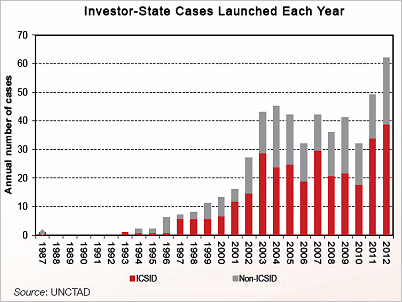
Where Public Citizen points to a disturbing order that Ecuador pay more than $2.4 billion to Occidental Petroleum ("roughly the government's annual expenditure on health care for half the country") for its unilateral "termination of an oil contract that Occidental had violated," the truly disturbing ruling entailed a decision by a bilateral arbitration tribunal to exercise jurisdiction in a case where Chevron was attempting to block an $18 billion judgment against it for its devastating contamination of Ecuador's Amazon rainforest and the poisoning of its inhabitants --- contamination that was so extensive that it has been referred to in the documentary film, Crude: The Real Price of Oil, as the "Amazon Chernobyl."
Chevron sought to shield itself from that judgment even after the U.S. 2d Circuit Court of Appeal, in Republic of Ecuador vs. Chevron Corp., ruled that the giant oil company could not do so because the individual victims of the massive contamination --- some 30,000 indigenous members of several Amazon tribes --- were not parties to the Bilateral Investment Treaty between Ecuador and the U.S.
Chevron's efforts to use U.S. courts to block the $18 billion Ecuador judgment ultimately ended when the U.S. Supreme Court summarily denied its petition for a writ of certiorari.
Growing resistance to TPP
Public Citizen has mixed the good news with the bad. A growing number of countries are rising to the occasion:
To be truly effective, that resistance must be joined by democratic forces within the United States, which serves as the heart of the global corporate empire. Instead of TPP, our nation would be better served to move in the opposite direction, repealing NAFTA-like "free trade" agreements and replacing them with fair trade agreements that respect human rights to a livable wage and a sustainable environment. It was a goal that was embodied in The Trade, Reform, Accountability, Development and Employment (TRADE) Act, as introduced in both the 110th and 111th Congress. TRADE had 148 co-sponsors in the House and 9 in the Senate but was never allowed to come up for a vote after being bottled-up in committees in both chambers. TRADE failed to receive an up-or-down vote despite polls showing that the American people favor fair trade over the chimera of so-called "free trade".
PREVIOUSLY RELATED BRAD BLOG COVERAGE:
• 8/5/2011: "Next 'Giant Sucking Sound': U.S. Senate Leaders Reach Accord on Three New 'Free Trade' Agreements"


 It's About Elections and the Windmills of His Mind: 'BradCast' 1/29/26
It's About Elections and the Windmills of His Mind: 'BradCast' 1/29/26 'Green News Report' 1/29/26
'Green News Report' 1/29/26
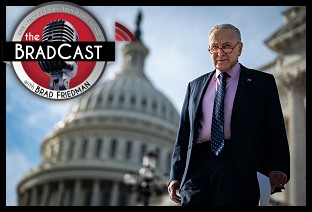 Govt Shutdown Over ICE Funding Near Certain This Weekend: 'BradCast' 1/28/26
Govt Shutdown Over ICE Funding Near Certain This Weekend: 'BradCast' 1/28/26 Trump Blinks, Bovino Out, MN Op Falters but Continues as Midterm Accountability Looms: 'BradCast' 1/27/26
Trump Blinks, Bovino Out, MN Op Falters but Continues as Midterm Accountability Looms: 'BradCast' 1/27/26 'Green News Report' 1/27/26
'Green News Report' 1/27/26 The ICE Murder of ICU Nurse Alex Pretti and the Heroes of Minneapolis: 'BradCast' 1/26/26
The ICE Murder of ICU Nurse Alex Pretti and the Heroes of Minneapolis: 'BradCast' 1/26/26  The BRAD BLOG: 22 Years and Still Counting
The BRAD BLOG: 22 Years and Still Counting Sunday 'Worth a Thousand Words' Toons
Sunday 'Worth a Thousand Words' Toons Mr. Smith Testifies (Publicly) in Washington: 'BradCast' 1/22/26
Mr. Smith Testifies (Publicly) in Washington: 'BradCast' 1/22/26 'Green News Report' 1/22/26
'Green News Report' 1/22/26 World Turning Against Self-Destructing U.S. Under Trump: 'BradCast' 1/21/26
World Turning Against Self-Destructing U.S. Under Trump: 'BradCast' 1/21/26 Trump Admin Waste, Fraud, Abuse on Voting, at DOJ, by DOGE: 'BradCast' 1/20/26
Trump Admin Waste, Fraud, Abuse on Voting, at DOJ, by DOGE: 'BradCast' 1/20/26 'Green News Report' 1/20/26
'Green News Report' 1/20/26 Sunday 'Domestic Terrorist' Toons
Sunday 'Domestic Terrorist' Toons 'Green News Report' 1/15/26
'Green News Report' 1/15/26 'A Cornered Rat': Trump Terrorizes Minneapolis, Menaces NATO, World: 'BradCast' 1/15/26
'A Cornered Rat': Trump Terrorizes Minneapolis, Menaces NATO, World: 'BradCast' 1/15/26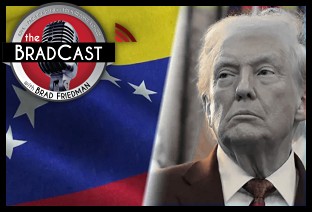 'Not Close to Over': Mad King Trump in Venezuela (& Beyond): 'BradCast' 1/14
'Not Close to Over': Mad King Trump in Venezuela (& Beyond): 'BradCast' 1/14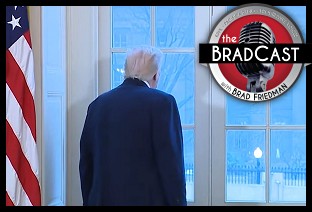 Things Getting Weirder as Trump Keeps Losing: 'BradCast' 1/13/26
Things Getting Weirder as Trump Keeps Losing: 'BradCast' 1/13/26 After ICE Murder in MN, Local Cops Disown Fed Policing Practices: 'BradCast' 1/12/26
After ICE Murder in MN, Local Cops Disown Fed Policing Practices: 'BradCast' 1/12/26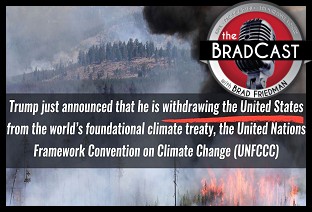 Trump to Congress, Climate, U.N., Rule of Law: DROP DEAD - 'BradCast' 1/8/26
Trump to Congress, Climate, U.N., Rule of Law: DROP DEAD - 'BradCast' 1/8/26 'Nonsense': Trumpers Claim 315k Fraudulent GA Votes in 2020: 'BradCast' 1/7/26
'Nonsense': Trumpers Claim 315k Fraudulent GA Votes in 2020: 'BradCast' 1/7/26 Jack Smith Testimony on Trump J6 Crimes, DOJ Weaponization: 'BradCast' 1/6/26
Jack Smith Testimony on Trump J6 Crimes, DOJ Weaponization: 'BradCast' 1/6/26 Trump War on Venez. is About Ego, Power, 'Alien Enemies Act': 'BradCast' 1/5/26
Trump War on Venez. is About Ego, Power, 'Alien Enemies Act': 'BradCast' 1/5/26
 VA GOP VOTER REG FRAUDSTER OFF HOOK
VA GOP VOTER REG FRAUDSTER OFF HOOK Criminal GOP Voter Registration Fraud Probe Expanding in VA
Criminal GOP Voter Registration Fraud Probe Expanding in VA DOJ PROBE SOUGHT AFTER VA ARREST
DOJ PROBE SOUGHT AFTER VA ARREST Arrest in VA: GOP Voter Reg Scandal Widens
Arrest in VA: GOP Voter Reg Scandal Widens ALL TOGETHER: ROVE, SPROUL, KOCHS, RNC
ALL TOGETHER: ROVE, SPROUL, KOCHS, RNC LATimes: RNC's 'Fired' Sproul Working for Repubs in 'as Many as 30 States'
LATimes: RNC's 'Fired' Sproul Working for Repubs in 'as Many as 30 States' 'Fired' Sproul Group 'Cloned', Still Working for Republicans in At Least 10 States
'Fired' Sproul Group 'Cloned', Still Working for Republicans in At Least 10 States FINALLY: FOX ON GOP REG FRAUD SCANDAL
FINALLY: FOX ON GOP REG FRAUD SCANDAL COLORADO FOLLOWS FLORIDA WITH GOP CRIMINAL INVESTIGATION
COLORADO FOLLOWS FLORIDA WITH GOP CRIMINAL INVESTIGATION CRIMINAL PROBE LAUNCHED INTO GOP VOTER REGISTRATION FRAUD SCANDAL IN FL
CRIMINAL PROBE LAUNCHED INTO GOP VOTER REGISTRATION FRAUD SCANDAL IN FL Brad Breaks PA Photo ID & GOP Registration Fraud Scandal News on Hartmann TV
Brad Breaks PA Photo ID & GOP Registration Fraud Scandal News on Hartmann TV  CAUGHT ON TAPE: COORDINATED NATIONWIDE GOP VOTER REG SCAM
CAUGHT ON TAPE: COORDINATED NATIONWIDE GOP VOTER REG SCAM CRIMINAL ELECTION FRAUD COMPLAINT FILED AGAINST GOP 'FRAUD' FIRM
CRIMINAL ELECTION FRAUD COMPLAINT FILED AGAINST GOP 'FRAUD' FIRM RICK SCOTT GETS ROLLED IN GOP REGISTRATION FRAUD SCANDAL
RICK SCOTT GETS ROLLED IN GOP REGISTRATION FRAUD SCANDAL VIDEO: Brad Breaks GOP Reg Fraud Scandal on Hartmann TV
VIDEO: Brad Breaks GOP Reg Fraud Scandal on Hartmann TV RNC FIRES NATIONAL VOTER REGISTRATION FIRM FOR FRAUD
RNC FIRES NATIONAL VOTER REGISTRATION FIRM FOR FRAUD EXCLUSIVE: Intvw w/ FL Official Who First Discovered GOP Reg Fraud
EXCLUSIVE: Intvw w/ FL Official Who First Discovered GOP Reg Fraud GOP REGISTRATION FRAUD FOUND IN FL
GOP REGISTRATION FRAUD FOUND IN FL

































